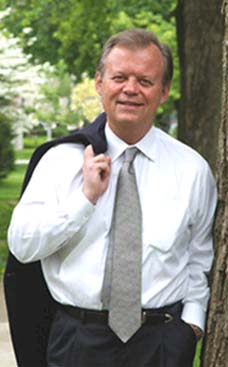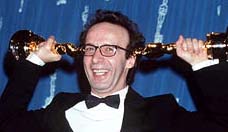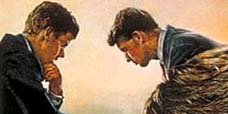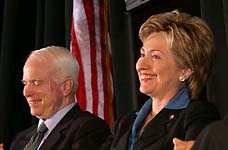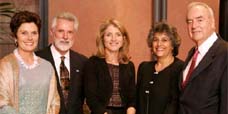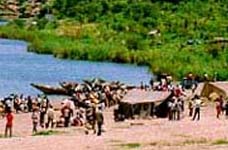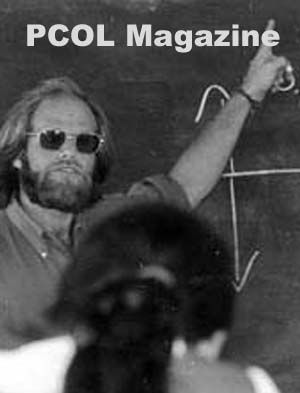
"Weiss's book deals with the betrayal of one aspect of Kennedy's vision: the pledge that Peace Corps volunteers would not only live in the same conditions as the people they served but be subject to their host country's laws, without special treatment. American Taboo tells the story of Deborah Gardner, a volunteer in the Pacific island nation of Tonga who was murdered by a fellow volunteer in 1976. The Peace Corps intervened to hush up the crime and prevent the Tongan courts from convicting her murderer--allowing him, in the end, to escape scot-free."
Matt Steinglass writes on "American Taboo"
Requiem for a Dream
Matt Steinglass
In a cluster of beach bungalows in Ghana in December 2000, my wife and I encountered the Peace Corps dream. The dream appeared in the form of a 24-year-old volunteer from Wisconsin, wiry, tan, with dark, shaggy locks of hair that fell to his eyes, riding a black BMW motorcycle. He had just spent two years in a desert village in Niger, and he was traveling with his girlfriend, a delicious Norwegian blonde, who was doing a fellowship in anthropology at Legon University in Accra. They had extremely vocal sex all night, and spent the day sipping mango juice on the beach. Later that week we ran into them in an Irish theme pub in Accra, and when a Ghanaian drinking partner mentioned he spoke Hausa, the trading language of the Sahel, the kid from Wisconsin put him to shame with his superior fluency. The Norwegian girl gazed at her Peace Corps man with a look that could have melted stone.
Philip Weiss's American Taboo: A Murder in the Peace Corps is a book about the end of the Peace Corps dream, but the dream Weiss has in mind is a somewhat different one. Weiss is talking about the original Peace Corps dream, which John F. Kennedy first articulated in an impromptu late-night bull session with University of Michigan students in October 1960. "How many of you are willing to spend ten years in Africa or Latin America or Asia working for the United States and working for freedom?" Kennedy asked. "How many of you who are going to be doctors are willing to spend your days in Ghana? On your willingness to do that, I think, will depend the answer to whether we as a free society can compete."
One has to call up the mindset of the Sputnik era to understand why Kennedy might have thought this, why he failed to realize that the Soviet inclinations of Nkrumah's Ghana would be vanquished less by Hausa-speaking volunteers than by Irish theme pubs. In any case, Weiss's book deals with the betrayal of one aspect of Kennedy's vision: the pledge that Peace Corps volunteers would not only live in the same conditions as the people they served but be subject to their host country's laws, without special treatment. American Taboo tells the story of Deborah Gardner, a volunteer in the Pacific island nation of Tonga who was murdered by a fellow volunteer in 1976. The Peace Corps intervened to hush up the crime and prevent the Tongan courts from convicting her murderer--allowing him, in the end, to escape scot-free.
As a tale of sexual violence, Gardner's story is sadly routine, apart from its exotic setting. She was a 22-year-old beauty from small-town Washington State when she signed up for the Peace Corps in late 1975. Strong-willed and uninhibited, she adapted well to the poverty and isolation that make Peace Corps life such a psychological challenge. She had more trouble with the restrictive gender codes of Tongan society, whose conservative Christianity overlays extensive traditional social and sexual taboos. Gardner wanted to ride her bike around alone at night and go skinny-dipping in the harbor. Meanwhile, this being the mid-1970s, she was carrying on a series of sometimes overlapping love affairs with male volunteers.
One volunteer Gardner considered a friend, but had no romantic interest in, was Dennis Priven, a sarcastic and withdrawn chemistry teacher from Brooklyn. Priven gradually became obsessed with Gardner, and by the autumn of 1976 he was stalking her. He applied to stay an extra year in Tonga, although, by all accounts, he hated the country. In early October Gardner spent the night with Priven's best friend, a funky San Francisco art student named Emile Hons, and this seems to have pushed Priven over the edge. On October 14, 1976, Priven burst into Gardner's house and stabbed her more than twenty times with a large fishing knife. She died in the local hospital a few hours later. Priven turned himself in, but without making a confession.
As soon as it became known that another volunteer was the likely killer, the Peace Corps stepped in to protect him. The Tonga country director, an overwrought and underqualified political appointee named Mary George, was advised by State Department lawyers to arrange counsel for Priven, then step aside. Instead, she repeatedly asked the local police chief to drop the charges, and convinced Peace Corps to fly in a defense-witness psychiatrist from Hawaii, who obligingly testified that Priven was schizophrenic. The Peace Corps hired Priven the best lawyer in Tonga. While the outmatched prosecutor had multiple witnesses to the struggle between Priven and Gardner, he was unprepared for the insanity defense, which had never been mounted in Tonga.
After Priven was found not guilty by reason of insanity, the State Department negotiated his return to the United States, on condition that he be committed to an institution. But American diplomats misstated their authority to the Tongans. In fact, Priven could not be held in the United States unless an American psychiatrist found him dangerously insane. The head of psychiatry at DC's Sibley Hospital instead found the supposedly schizophrenic Priven to be perfectly sane. And so Deborah Gardner's killer walked. The Peace Corps, which had managed to keep the trial out of the news, left Gardner's parents with the impression that Priven was in a mental institution. They didn't learn the truth until Weiss contacted them while researching the book.
Cooperating with Weiss was clearly a wrenching experience for Gardner's family and friends, and some of them questioned his motives. The reader will, too, partly because Weiss devotes a lot of time to them, and his self-analysis rings somewhat false. At times, he focuses on his sympathy for Gardner, but this is a bit unseemly: There's something Laura Palmerish about a middle-aged man's unsolicited concern for an attractive dead girl. Elsewhere, he relates conversations with friends of Gardner who begged him to "tell the untold story." This smacks of self-justification. It should be enough for Weiss that Gardner's murder makes a smashing tale; the relatives might reproach him for profiting from it, but readers wouldn't.
This isn't the only area where Weiss tends to overwrite. The physical setting of Tonga is striking enough, but Weiss torques it up: "a fish fence stood out against the pale horizon like so many sharp vertical lines in india ink." This would be fine except that Weiss is writing about an event in 1976, where he was not present. He makes the same mistake with characters' feelings; his use of the indirect style can be maddeningly histrionic:
Vic's breath choked in his throat. It was like someone had kicked him in the chest, still he didn't cry, he wouldn't let that happen, but he covered his eyes and thought of the bad way he and Deb had left off.
The reader can't help but wonder how Weiss knows that it felt like a kick in the chest. What kind of an interview led to this passage? "How did it feel when you heard?" "Philip, it felt like someone kicked me in the chest." "Did you cry?" Weiss even makes a disastrous attempt at circularity, repeating the book's first sentence as its last one. The only reason a reader would recognize the device is that the line is so incomprehensible as a closer that one looks back to the beginning to figure out what's going on.
On the bright side, Weiss has done a spectacular job of researching the case. He spent years interviewing dozens of former volunteers who were in Tonga with Gardner. He cites documents--State Department telexes, volunteers' letters home, court records--to great effect, and his assessments of the internal politics of the Peace Corps and the Tongan government are persuasive. His reconstruction of Tonga in 1976, and his account of the crime, are exquisitely detailed. And his character portraits are rich, if often overdone. The most striking is Mary George, an extravagantly dressed ex-model who was appointed country director by virtue of her relationship with a Ford Administration bigwig, and threw herself into Priven's defense after experiencing a religious vision of Deb Gardner's "real" killer--a Tongan, of course.
Finally, Weiss found Dennis Priven, living in a nondescript apartment in Sheepshead Bay and running the computer department of the Social Security Administration's Brooklyn office. The book's finale, an account of the afternoon Weiss spent at Dean & DeLuca talking to Deborah Gardner's goofy and disturbingly personable killer, has all the makings of a truly great scene--Orson Welles in The Third Man, as remade by Todd Solondz.
And yet it doesn't quite work. Perhaps this is because Weiss consistently fails in his efforts to impart larger significance to his story. He wants to make Gardner's death emblematic of the death of a certain Peace Corps ideal. "Peace Corps was another bureaucracy, fighting for its existence on Capitol Hill," he writes; officials had hushed up the case and worked to free Gardner's murderer in order to "preserve their own careers, to preserve the American presence in the South Pacific, to preserve the churchly image of the Peace Corps."
But this description doesn't fit the case. The Peace Corps's attempts to keep the case quiet certainly suited its organizational interests. But its efforts to free Dennis Priven were driven more by the caprices of Mary George, who seems to have had a poor understanding of the organization, and who was pushed out some months after the trial largely because of her actions on behalf of Priven. Weiss alleges that the attempt to get Priven acquitted and shipped out of Tonga was motivated by a desire to preserve the Peace Corps program there. But in Weiss's own description, the Peace Corps's efforts to defend Priven generated enormous anger on the part of both Tongan authorities and average Tongans, not to mention other volunteers. How did this help preserve the program?
If there is something that the Peace Corps's efforts to free Dennis Priven emblematizes, it would have to be the intensity of Americans' phobic aversion to being tried by any courts other than American ones. The Pentagon's refusal to allow American soldiers to be tried either in international or in foreign national courts is notorious, but the same attitude is shared by Americans of all stripes. What American parents would consent to having their Peace Corps-volunteer child tried in some Third World court? The Gardner case is the most striking illustration of Americans' hostility to foreign justice, precisely because the most internationalist of American governmental organizations went to extraordinary lengths to get Dennis Priven out--even though it meant helping a volunteer's murderer escape from justice, and damaging its own Tonga program in the process.
As for the death of the Peace Corps dream, the Peace Corps of today may not be quite the entity John Kennedy had in mind on that night in Michigan in 1960, but that doesn't have much to do with Deborah Gardner's murder. Kennedy envisioned an organization of well-trained volunteers carrying out intensive, 1960s-style development programs. The Peace Corps has never been that. If the Peace Corps were evaluated on the same indices as professional development organizations and NGOs, it would do poorly. The American public still seems to believe Peace Corps volunteers are flown in to rescue countries in humanitarian crises, like the Gwyneth Paltrow character in Shallow Hal. In fact, of course, Peace Corps volunteers don't get flown in when things fall apart; they get evacuated. The United States has a professional governmental development organization. It's called USAID. The Peace Corps is something else.
What the Peace Corps is--the reason it's a great program, the reason President Bush (of all people!) is right to have given it substantial budget increases in the past few years--is the best, if not the only, bridge between American youth and the developing world. Peace Corps volunteers may or may not help impoverished villages eradicate Guinea worms or get more girls into school. But they learn to live like the locals, speak like the locals, eat like the locals and shit like the locals, and they constitute the best possible public-relations campaign for American goodwill in the developing world. When they come home, they are among the few Americans who have any clue how most of the world lives. I'm not sure how much that Hausa-speaking Adonis from Wisconsin did for Niger in his two years there--if, in fact, anything can be done for Niger. But his version of the Peace Corps dream is far from dead, and that dream is vital, because it not only gets American kids interested in the poor of the world; it makes it seem cool.





